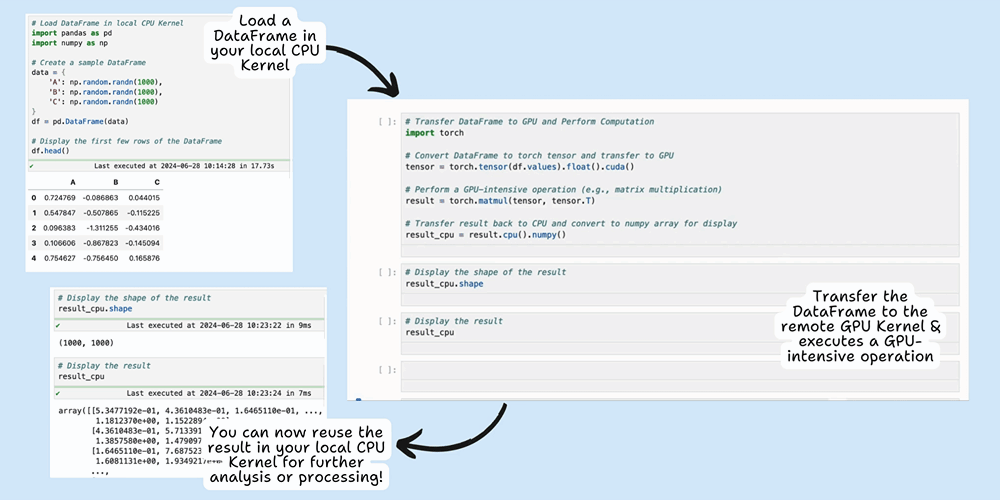Black Snake Release
We're excited to announce the release of Datalayer 1.2.0 — Black Snake — a major release packed with new features and enhancements that significantly improve performance and user experience.
The Datalayer Black Snake release is named as a tribute to the Python opensource community as to the companies like Anaconda and Quansight for their support in driving innovation in the open.

New Features
Cell-Specific Kernels: Execute specific cells with different kernels, optimizing costs by leveraging local resources for data preparation and remote resources for intensive computations.
Cell Kernel execution

The remote GPU Kernel is utilized only for the duration of the cell computation, minimizing costs.
CLI Execution: Execute code remotely from your local terminal.
CLI Remote Execution

Sharing State between Notebook and CLI

When using the same Kernel, variables defined in a notebook can be used in the CLI and vice versa. This holds also true when using multiple notebooks connected to the same kernel, for example.
User storage: Users can now persist data across kernels sessions. Read more about it in this blog post.
Bug Fixes and Stability Improvements
Improved Kernel Stability: Addressed several kernel stability issues that users encountered when running long-running processes.
Resolved Environment Variable Conflicts: Fixed issues related to environment variable management in GPU-accelerated environments, ensuring smoother integration with external services and data sources.
Security Enhancements: Continued improvements in secret management and encryption to ensure safe data handling when accessing external data sources and services.
Local storage mount was deprecated in this release. We plan to reintroduce it in the next release with improved security and performance.
How to Get Started
Existing Users: Existing users can update their environments to Datalayer 1.2.0.
pip install datalayer --upgrade
New Users: New users can ask for an invitation to the beta and get started with Datalayer by following the documentation:
- Use it with JupyterLab: Read the documentation on https://docs.datalayer.app/jupyterlab
- Use it with Visual Studio Code: Read the documentation on https://docs.datalayer.app/vs-code
- Use it with a Command Line Interface: Read the documentation on https://docs.datalayer.app/cli
Upcoming Features
Storage Management: Enhanced storage management capabilities will be introduced in the next release, allowing users to manage their data more efficiently.
Expanded Data Source Support: More integrations with popular data sources will soon be available, further simplifying cloud data access.
User Environment: Users will be able to create their custom environments, allowing them to install specific packages and libraries.
Collaboration: Stay tuned for collaborative features coming in the next release, allowing multiple users to work together with the same kernel.
